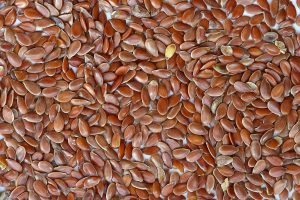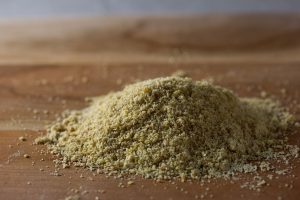Flax protein may improve cardiovascular health and bowel movements.

- Supporting cardiovascular health. Flax protein may lower blood glucose levels, blood pressure, and regulate blood lipids.
- Acting as a laxative. Flax protein may help promote bowel movements.
Overview
Originating in ancient Egypt, flax, Linum usitatissimum, is primarily a food crop grown in cooler regions all around the world. Since its introduction to the Americas centuries ago, flax plants have been used to produce linen as well as incorporated into various recipes. Almost every part of the flaxseed plant is now prepared and used commercially:
- The stem yields durable fibers that are 2 to 3 times stronger than cotton
- The seed is emerging as an important food source due to its abundant supply of healthy ingredients, including high quality protein, soluble fiber, and phenolic compounds 1 2
- The oil is used as a drying product for paints, varnish, and printing inks, and is also edible
Flaxseed has a history of use in health and medicine as well, including the management of upper respiratory infections, constipation, indigestion, skin inflammation, and pain. Meanwhile, the protein present in flax contains several active ingredients with potential health benefits:
- Lignans, especially secoisolariciresinol diglycoside (SDG)
- Fiber mucilage, including D-xylose, L-galactose, L-rhamnose, and D-galacturonic acid
- Alpha-linolenic acid (ALA), which is an omega-3 fatty acid3

Flax Protein’s Beneficial Bio-Activities
Antioxidant activity
As a rich source of lignans, flax protein has notable antioxidant qualities. Lignans block the pathway of platelet-activating factor, which inhibits the production of free radicals by white blood cells known as neutrophils.4 Fewer free radicals in the body naturally leads to decreased oxidative stress and tissue damage. The antioxidation of lignans have been shown to protect heart, colon, and breast cells from damage.5 6 7
Anti-inflammatory activity
Flaxseed and its oil may wield anti-inflammatory properties because of its high ALA content. When converted into the omega-3 fatty acids eicosapentaenoic acid (EPA) and docosahexaenoic acid (DPA), ALA stops certain white blood cells from releasing leukotriene B4, arachidonic acid, and platelet-activating factor, which otherwise trigger inflammation.8 9
Regulation of blood lipids
Flax protein has been shown to improve cardiovascular health by lowering the presence of a variety of lipids in the blood, including low-density lipoprotein (LDL) cholesterol, triglycerides, and general plaque content.10 As a corollary, the hyperglycemic effects of ALA have been found to reduce blood glucose levels and lower blood pressure.11 12
Laxative effect
The fiber content of flax protein is believed to enhance gastric emptying time, increase fecal volume, interfere with bulk-phase diffusion of fat, and increase the excretion of bile acids. These effects, along with significantly elevating the number of bowel movements per week, enable flax protein to challenge constipation.13
Flax Protein’s Reputation & Benefits

- Digestion. Flax protein is a rich source of fiber that promotes bowel movements.
- Cardiovascular health. Flax protein may lower blood glucose, blood pressure, “bad” cholesterol, and triglyceride levels, which is excellent for people concerned about type II diabetes and cardiovascular complications, such as atherosclerosis.14
Furthermore, the rich supply of ALA in flax protein imbues it with natural antioxidant and anti-inflammatory properties, which are important to overall well-being.
Research
Animal Research
Animal research indicates that flax protein may promote a variety of health benefits, such as:
- Relaxing arteries in rats with high blood pressure15
- Reducing cholesterol levels in mice16
- Reducing the buildup of plaque in rabbit arteries17
- Lowering triglyceride levels as well as fat deposition in lean and obese rats18
- Improving laxation, as determined by start time to defecation, stool frequency, and weight in mice19
- Antioxidant activity in rabbits, especially diminishing damage to tissues caused by lipid peroxidation20
- Anti-inflammatory activity in rats with inflammatory conditions affecting the kidneys21
Human Research
Clinical research highlights the wide-ranging impact of flax protein supplementation, particularly on cardiovascular and gastrointestinal health.
Flaxseed (50 g) may lower LDL cholesterol levels
In this randomized, placebo-controlled investigation, 29 hyperlipidemic adults were given a muffin made of either 50 grams of flaxseed or wheat bran for 2 treatment periods, each lasting 3 weeks. Compared to the control, the partially defatted flaxseed was found to significantly reduce total cholesterol by 4.6 ± 1.2%, LDL cholesterol by 7.6 ± 1.8%, apolipoprotein B by 5.4 ± 1.4%, and apolipoprotein A-I by 5.8 ± 1.9%. There were no significant effects on serum HDL cholesterol.
- The study concluded that “partially defatted flaxseed is effective in lowering LDL cholesterol.”22
In this randomized, double-blind, placebo-controlled investigation, 55 patients with hypercholesterolemia were given 0, 300, or 600 mg of dietary secoisolariciresinol diglucoside (SDG) from flaxseed extract daily. Total cholesterol and LDL cholesterol concentrations were significantly reduced (from 22.0 to 24.38 %, respectively) in the 300 and 600 mg groups. The 600 mg group also experienced a substantial reduction in fasting plasma glucose levels of about 25%.
- The study concluded that “dietary flaxseed lignan extract decreased plasma cholesterol and glucose concentrations in a dose-dependent manner.”23
Flaxseed (30 g) may improve cardiovascular status in patients with peripheral artery disease
In this double-blind, randomized, placebo-controlled clinical trial, 110 patients with peripheral artery disease (PAD) received either a placebo or 30 grams of flaxseed every day over a 1-year period (FLAX-PAD study). The flaxseed diet resulted in improvements in various cardiovascular conditions, such as exercise performance, blood pressure and circulating lipid levels.
- The study concluded that “FLAX-PAD will generate data on the safety, tolerability, cardiovascular efficacy and genomic response to a diet rich in flaxseed.”24
Flaxseed (15 g) may promote bowel movements
In this investigation, 25 adults consumed 15 grams of flaxseed fiber or a psyllium supplement every day for 2 weeks. Both flaxseed and psyllium fibers increased fecal bulking capacity of about 2.9 and 4.8 grams of fecal weight per gram of fiber, respectively. In a continuing study, the volunteers were given either flax bread or white bread at a similar dosage and for a similar timeframe. Flax bread significantly improved blood glucose values compared to the control.
- The study concluded that “a flax fiber supplement provides the benefits of soluble and insoluble fiber.”25
Flaxseed (50 g) may reduce cholesterol and glucose levels
In this investigation, female volunteers took 50 grams of ground, raw flaxseed every day for 4 weeks. Flaxseed supplementation elevated alpha-linolenic acid and omega-3 fatty acid levels, lowered total cholesterol by 9% and LDL cholesterol by 18%, and decreased blood glucose levels after meals by 27%.
- The study concluded that “50 g high-alpha-linolenic acid flaxseed/d is palatable, safe and may be nutritionally beneficial in humans by raising n-3 fatty acids in plasma and erythrocytes and by decreasing postprandial glucose responses.”26
Flaxseed (30 g) may help protect the kidneys from inflammatory conditions
In this investigation, 9 patients with lupus nephritis were given 15, 30, and 45 grams of flaxseed per day sequentially for 4-week intervals. Flaxseed was found to significantly reduce total and LDL cholesterol levels as well as fat content in the blood. Significant declines in serum creatine (a marker of kidney damage) and proteinuria (proteins in the urine) were also reported.
- The study concluded that “30 g flaxseed/day was well tolerated and conferred benefit in terms of renal function as well as inflammatory and atherogenic mechanisms important in the pathogenesis of lupus nephritis.”27
Flax Protein Dosage
- Successful research studies use from 30 – 80 grams of flaxseed.
- Typical flax protein supplements are taken at 30 – 35 grams (1 to 2 ounces) per day.
- Flax protein supplements for promoting bowel regularity are taken as 1 tablespoon (15 ml) of whole or ground flaxseed mixed in water, 1 – 2 times daily.
Supplements in Review Says
- Flaxseed powder 10+ g taken daily.
Flax protein may promote cardiovascular and gastrointestinal health. Flax protein is not only a vegetarian and vegan alternative to standard protein supplements, but also an enhancer of cardiovascular and gastrointestinal health.
Dosing depends on your goals. Flax seed supplements suggest starting with a small 10 g dose.
Leave a Reply